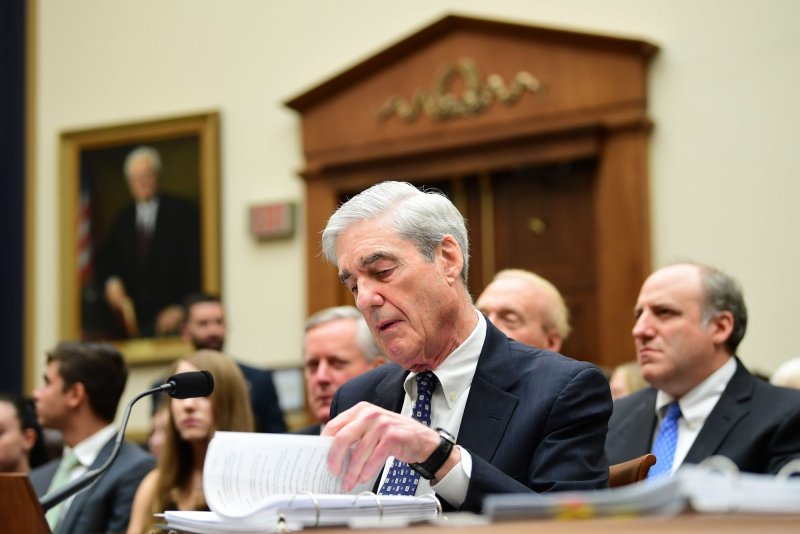Former special counsel Robert Mueller examines his report during testimony of his investigation into Russian interference in the 2016 presidential election. It was at a House Judiciary Committee hearing on Capitol Hill on July 24. Photo by Kevin Dietsch/UPI |
License Photo
Nov. 2 (UPI) -- The U.S. Justice Department on Saturday released FBI interview summaries and documents as part of Robert Mueller's investigation of Russian interference in the 2016 presidential election and possible obstruction of justice by President Donald Trump.
Released Saturday to BuzzFeed News were 278 pages of summaries of FBI interviews with key witnesses as well as emails and documents related to them. New records will be released every month for the next eight years. Also the release noted 237 pages were withheld. CNN obtained 274 pages of information.
The documents include redactions and some are handwritten.
BuzzFeed News had filed five separate Freedom of Information Act lawsuits, including subpoenas and search warrants, emails, memos, letters, talking points, legal opinions and interview transcripts it created.
The Justice Department had resisted releasing the documents, noting it would be difficult to go through 18 billion pages.
U.S. District Judge Reggie Walton said Congress could be asked for assistance if it couldn't handle releasing the requested documents.
Saturday's document dump, known as "302 reports," are summaries of interviews -- conducted with former White House official and Trump campaign manager Stephen Bannon; Michael Cohen, who was Trump's former attorney, and Rick Gates, Trump's deputy campaign chairman.
Last March, Mueller's 448-page report included evidence of Russia's interference in the 2016 election, including hacking emails from the Democratic National Committee, and the Trump administration's efforts to obstruct the inquiry. Mueller was unable to "conclusively determine" that no criminal conduct occurred in obstruction of justice.
As early as 2016, Trump's campaign manager Paul Manafort was pushing the unfounded conspiracy theory that Ukraine hacked the emails instead of Russia.
Manafort had lobbied on behalf of former Ukraine President Ukraine Viktor Yanukovych and was associated with Konstantin Kilimnik, who is believed to have ties to Russian intelligence. He was convicted of tax and bank fraud in 2018
According to notes from the interview, "Gates recalled Manafort saying the hack was likely carried out by the Ukrainians, not the Russians, which parroted a narative Kilimnik often supported. Kilimnik also opined the hack could have been perpetrated by Russian operatives in Ukraine."
During a July 25 phone call with Ukrainian President Volodymyr Zelensky, Trump described the conspiracy theory. It now is part of a U.S. House impeachment inquiry.
"I would like you to find out what happened with this whole situation with Ukraine, they say CrowdStrike ... I guess you have one of your wealthy people... The server, they say Ukraine has it."
Emails by Bannon showed that Manafort was advising the Trump campaign just days before the election, despite being fired in August.
"Paul is nice guy [sic] but we can't let word get out he is advising us," he said in an email on Nov. 5, 2016. "They are going to try to say the Russians worked with wiki leaks [sic] to give this victory to us."
According the documents, Bannon first met Trump in August 2010.
Gates said the campaign was "very happy" when the hacked DNC emails were released.
Gates, in the interview with Mueller investigators, described how several close advisers to Trump, Trump's family members and Trump pushed for getting the stolen documents from the DNC. WikiLeaks later released the emails.
Trump was also interested in finding the 33,000 missing Hillary Clinton emails that she said she had erased from her private server, according to the documents. Clinton was the 2016 Democratic nominee who lost to Trump, the Republican.
"Gates said the priority focuses of the Trump campaign opposition research team were Clinton's emails and contributions to the Clinton Foundation. Flynn, [Redacted] [Jeff] Sessions, Kushner, and [Donald] Trump Jr. were all focused on opposition topics," Gates told investigators, according to the interview summary.
According to documents, "COHEN has to keep TRUMP out of the messaging related to Russia and keep TRUMP out of the Russia conversation," in preparation for his testimony in 2017 to Congress.
In February, Cohen later told Congress that, "In his way, he was telling me to lie" about concealing negotiations to build a Trump Tower in Moscow.















